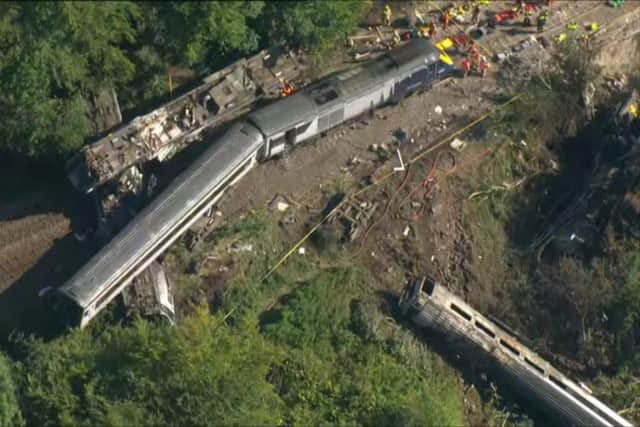Carmont rail crash: Network Rail must act fast on official investigation
But when they do, they have something important to say.
That became quickly apparent in Aberdeen on Wednesday when four expert officials from the UK Government body set out the key points of their 296-page final report into the fatal Carmont rail crash, in which three people died in 2020.
To underline the significance of the incident, those were the first people to have been killed on a train in Britain for an unprecedented 13 years, and the first in Scotland for more than a quarter of a century.


Advertisement
Hide AdAdvertisement
Hide AdThe “dreadful damage” at Carmont, as RAIB deputy chief inspector Andrew Hall put it, was not caused by some chance happening, but specific failings, compounded by others in the way our railways are operated.
As the RAIB’s weighty document, published today, sets out in detail, there was a startling amount awry with the network that contributed to the disaster, and must be addressed.
In particular, I was struck by the number of times the report stated that Network Rail “did not” do this or “had not” done that.
These include over how the infrastructure body both oversaw its trackside drainage and operated in extreme weather.
As an example, despite the disruption caused by the downpours on the day of the crash, the RAIB said extra control room staff had not been drafted in, and controllers had not been given sufficient training to “effectively manage” such complex situations.
The organisation relied on accurate forecasting, reliable risk assessment, deploying “sufficient resource” and monitoring rain as it fell.
But RAIB’s said “in all these areas, Network Rail had yet to meet its own aspirations”.
There is an urgency to all this too, as Andrew Hall told the briefing: “The accident at Carmont was not the first of its type.
Advertisement
Hide AdAdvertisement
Hide Ad"We are seeing a change in the climate and it’s very likely in the future we will see more incidents.
"Network Rail needs to ensure the lessons learned from the investigation of accidents translate into real action that makes a difference in a timely fashion.”
A message from the Editor:
Thank you for reading this article. We're more reliant on your support than ever as the shift in consumer habits brought about by coronavirus impacts our advertisers.
If you haven't already, please consider supporting our trusted, fact-checked journalism by taking out a digital subscription.
Comments
Want to join the conversation? Please or to comment on this article.